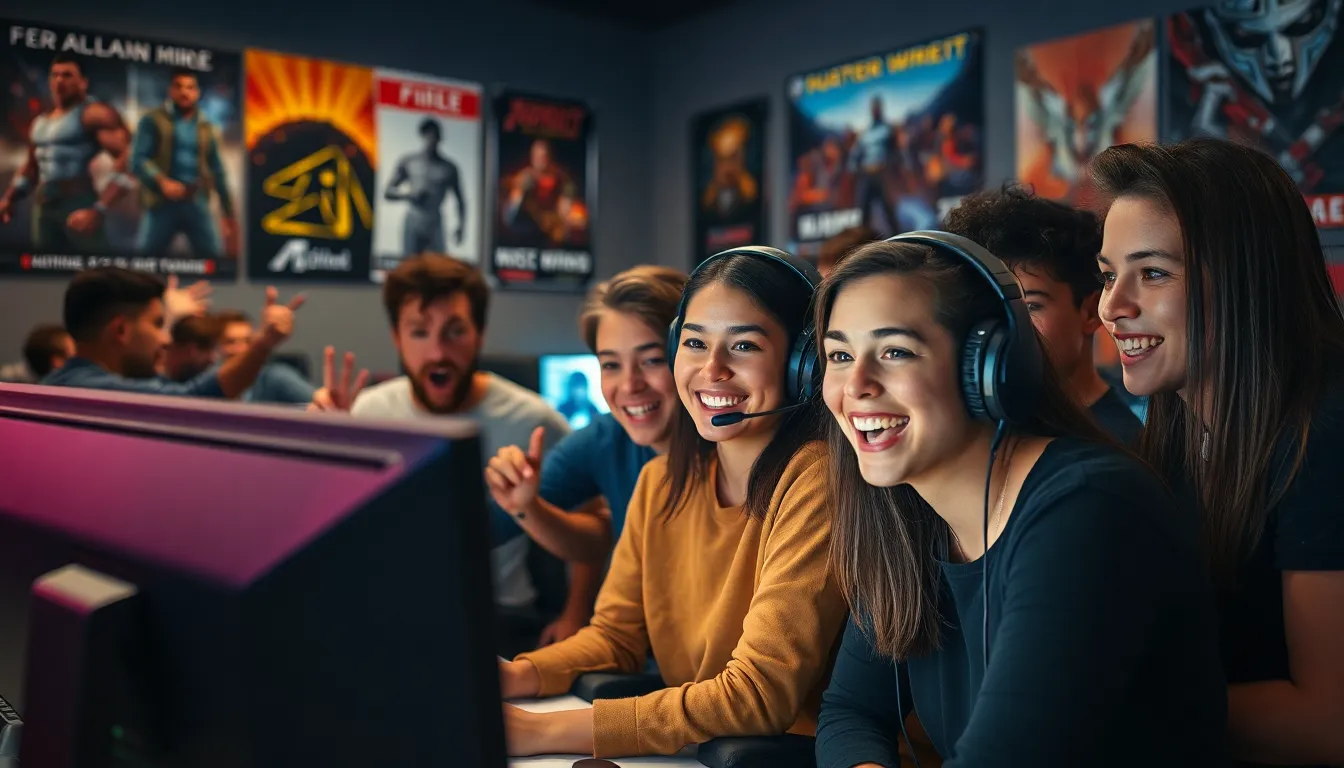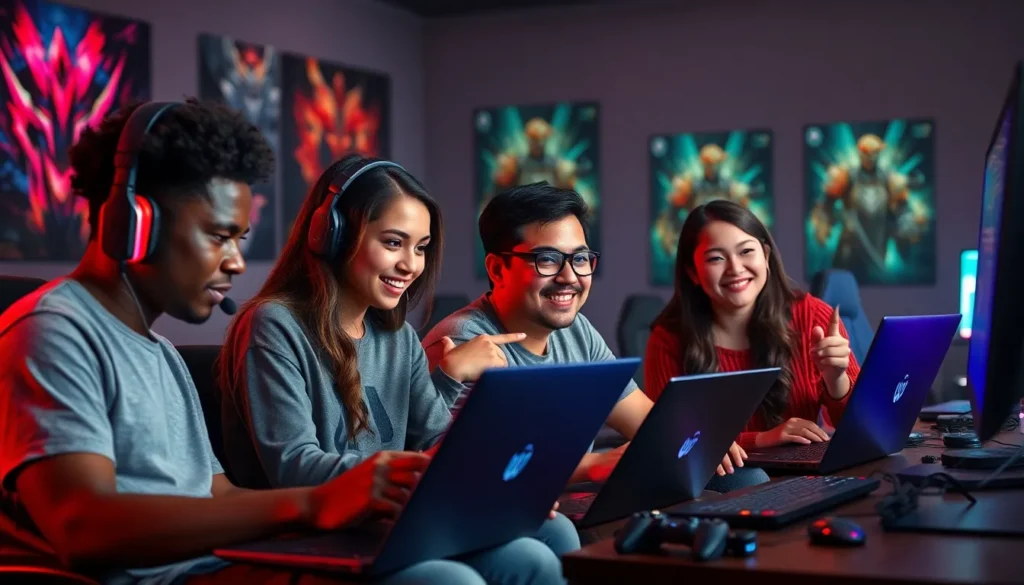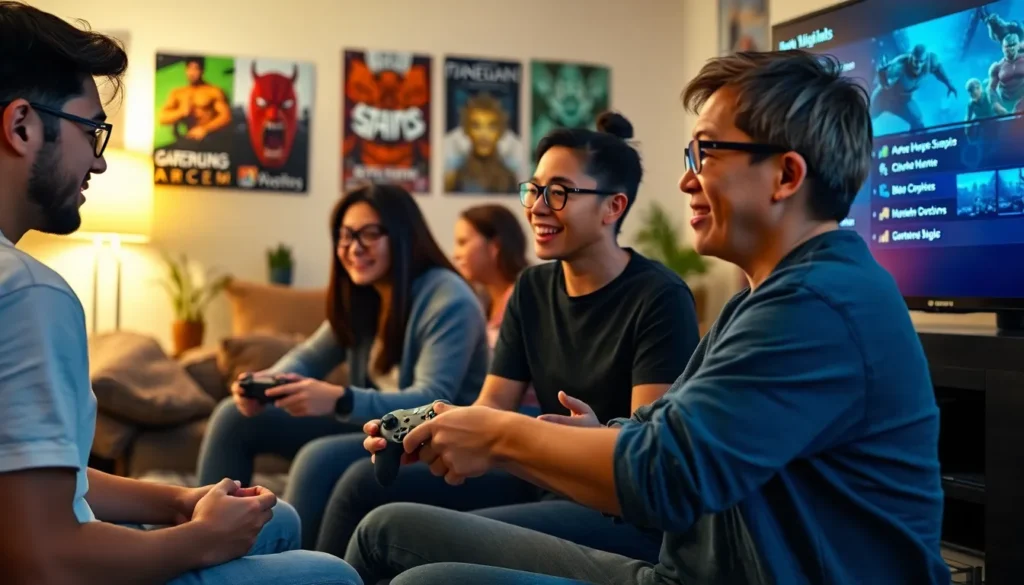Table of Contents
ToggleIn the ever-evolving world of gaming, clan reward systems are the secret sauce that keeps players coming back for more. Imagine a place where teamwork, strategy, and a little friendly competition can lead to epic loot and bragging rights. It’s like a virtual treasure hunt, but instead of pirates, you’ve got your trusty clanmates by your side, ready to conquer challenges and reap the rewards.
Overview of Clan Reward Systems
Clan reward systems play a crucial role in enhancing the gaming experience. These structures motivate players to participate actively within their clans. Players often engage in challenges and quests that grant rewards based on their collaboration and performance. Incentives can range from in-game currency to exclusive items, which foster a sense of achievement and progress.
Rewards typically differ depending on the clan’s objectives and the game’s design. Different games might provide varying tiers of rewards, where greater challenges yield more significant benefits. Participation in clan activities could lead to unlocking unique features, enticing players to invest time and effort.
Integrating a reward system encourages teamwork, as players often need to strategize together to maximize their earnings. Successful completion of tasks and quests often boosts clan rankings, further motivating members to contribute. Levels of engagement increase with the potential for clan-wide rewards, adding a competitive angle to the experience.
Regular updates and new reward opportunities keep players returning. Developers might introduce seasonal events that offer limited-time rewards, sparking enthusiasm among clan members. Players often discuss strategies and share tips to achieve these goals, reinforcing community bonds.
Feedback from community members frequently shapes future reward structures. Developers adapt based on engagement metrics and player satisfaction. As clans grow and evolve, so too can the reward systems that drive them, ensuring that gameplay remains fresh and compelling.
Key Components of Clan Reward Systems

Clan reward systems encompass essential elements that enhance player engagement, fostering teamwork and competitive spirit. Understanding the types of rewards and distribution methods is crucial for effective implementation.
Types of Rewards
Rewards typically include in-game currency, exclusive items, and clan-specific achievements. Players often earn these rewards through various activities such as completing missions or participating in clan events. Exclusive items can enhance player experiences by providing unique cosmetic enhancements or gameplay advantages. Additionally, badge systems offer recognition for individual accomplishments, motivating players to strive for higher goals. Collaborative challenges can yield shared rewards, reinforcing teamwork among clan members. Seasonal events introduce limited-time rewards that keep the gaming experience fresh and exciting. Ultimately, diverse rewards cater to different player preferences and drive engagement.
Distribution Methods
Distribution methods primarily involve direct allocation, tiered systems, or random draws. Direct allocation assigns rewards based on individual and clan performance, ensuring that participation directly correlates to benefits. Tiered systems allow for scaling rewards, where achieving higher objectives unlocks more significant gains. Random draws can surprise players with unexpected bonuses, adding an element of excitement. Timely distribution maintains player interest, while instant gratification can enhance satisfaction. Additionally, feedback loops can help adjust distribution methods to align with player preferences. Implementing effective distribution methods strengthens the community bond and encourages consistent participation.
Benefits of Clan Reward Systems
Clan reward systems significantly improve the gaming experience by fostering deeper player connections. They create an environment that promotes collaboration and competition, benefiting individuals and clans alike.
Enhanced Engagement
Engagement levels rise when players participate in clan activities, driven by the prospect of rewards. Reward systems often include in-game currency or exclusive items that entice players to join forces with clanmates. Unique challenges present opportunities for teamwork, encouraging communication and strategic planning. As players work together to tackle objectives, shared goals enhance the overall gaming experience and strengthen community ties. Clan members frequently return, motivated by new rewards and seasonal events that keep the gameplay dynamic. This continual influx of content maintains player interest over time and promotes a sense of belonging within the clan.
Improved Performance
Reward systems lead to improved performance as players strive to achieve clan objectives. Current metrics suggest that players are more likely to excel when motivated by tangible rewards, such as badges or exclusive items. Individual and clan success hinges on participation in challenges that require cooperation and skill. As players complete tasks and earn recognition, their confidence and dedication to the clan grow. Competitive elements within the reward structure drive clans to push their limits, striving for higher rankings and achievements. Adjustments to reward criteria based on player feedback ensure that the system remains relevant, mirroring the evolving dynamics of player performance and satisfaction.
Challenges in Implementing Clan Reward Systems
Implementing clan reward systems presents several challenges that can impact their effectiveness and player engagement.
Resistance to Change
Resistance to change often arises when introducing new reward systems. Players accustomed to existing structures may resist modifications, fearing decreased benefits or confusing mechanics. Adapting the system requires clear communication about improvements. Transparency regarding objectives helps mitigate concerns and fosters acceptance. They may need to participate in testing phases to ease transitions, allowing players to voice their opinions. Acknowledging player feedback plays a critical role in refining the reward structure, thus creating a smoother implementation process.
Balancing Fairness and Motivation
Balancing fairness and motivation remains a significant challenge in reward distribution. Rewards must feel equitable to all players while still encouraging competitive spirit. If certain players consistently receive better rewards, clan members might experience frustration. To address this, developers can use tiered systems that recognize varying levels of achievement without alienating other players. This approach ensures everyone feels valued while maintaining motivation to participate. Regularly adjusting the reward criteria based on player performance can also enhance the overall satisfaction. Engaging in community discussions assists developers in creating a fair and motivating environment for all participants.
Best Practices for Successful Clan Reward Systems
Successful clan reward systems rely on structured approaches and strategic implementation to enhance player experience. Implementing best practices ensures maximum engagement and satisfaction.
Setting Clear Goals
Establishing clear goals drives cohesion within the clan. Specific objectives guide players toward achieving rewards, enhancing focus on teamwork and collaboration. Goals can vary from weekly achievements to event-based milestones. Providing measurable targets allows players to track progress and feel a sense of accomplishment. Regularly revisiting and updating these goals keeps the challenge dynamic and relevant to player interests. Engaging players in goal-setting discussions empowers them to take ownership of their participation. This collaborative approach reinforces commitment and motivates clans to strategize effectively.
Encouraging Participation
Fostering an environment that encourages participation builds community engagement. Reward systems should include incentives for various levels of involvement, whether through completing tasks or participating in events. Introducing gamified elements, such as points or badges, can increase motivation among players. Regularly scheduled events create opportunities for everyone to contribute, ensuring inclusivity. Boosting participation can also involve recognizing individual efforts within the group, highlighting those who excel. Creating a friendly competition within the clan often encourages players to perform better, strengthening social ties. Consideration for diverse activities enhances overall engagement across different player preferences.
Clan reward systems play a crucial role in shaping the gaming experience by fostering collaboration and enhancing player engagement. By offering a variety of incentives players feel motivated to participate actively in clan activities. This not only strengthens community bonds but also drives players to achieve higher goals together.
As developers refine these systems based on player feedback the potential for growth and improvement remains significant. Regular updates and new challenges keep the gameplay fresh ensuring that players return time and again. Ultimately a well-implemented clan reward system can transform individual gaming experiences into a vibrant community effort.




